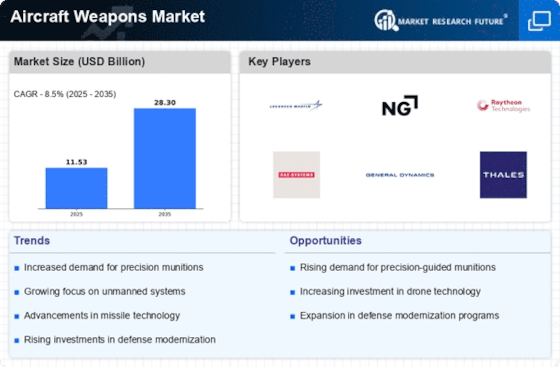Top Industry Leaders in the Aircraft Weapons Market

Aircraft Weapons Market
The Aircraft Weapons Market is a dynamic and rapidly evolving sector within the defense industry, driven by advancements in technology, geopolitical tensions, and the constant need for military modernization. This landscape is characterized by intense competition, with key players constantly striving to gain a competitive edge through innovation, strategic partnerships, and a keen focus on market trends.
Key Players:
Boeing Company
General Dynamics
Northrop Grumman
SAAB
Thales Group
Lockheed Martin
MDBA
Strategies Adopted: In a bid to maintain and enhance their market position, key players are adopting various strategies. One common approach is continuous research and development to introduce innovative and technologically advanced weapons systems. Strategic collaborations and partnerships, both domestic and international, are another crucial strategy. For instance, joint ventures and alliances enable companies to pool resources, share expertise, and address complex challenges in the development and production of aircraft weapons.
Factors for Market Share Analysis: Several factors contribute to the analysis of market share in the Aircraft Weapons Market. Technological capabilities, product diversification, global presence, and the ability to meet stringent regulatory requirements are key determinants. Additionally, companies that effectively leverage economies of scale and maintain strong relationships with government defense agencies tend to have a competitive advantage. Market share analysis also considers a company's ability to adapt to evolving geopolitical dynamics and changing threat landscapes, as well as its responsiveness to customer needs.
New and Emerging Companies: While established players dominate the Aircraft Weapons Market, the landscape is witnessing the emergence of new and innovative companies. These entrants are often characterized by niche offerings, disruptive technologies, and agility in adapting to market demands. Examples include Kratos Defense & Security Solutions, Inc., and AeroVironment, Inc. These companies are carving out their niche by specializing in unmanned aerial systems and advanced munitions, challenging traditional market dynamics.
Industry News and Current Company Investment Trends: Recent industry news and investment trends highlight the ongoing developments in the Aircraft Weapons Market. Increased emphasis on autonomous capabilities, artificial intelligence, and cyber resilience are shaping research and development initiatives. Companies are investing heavily in next-generation technologies to enhance the precision, range, and lethality of their weapons systems. Additionally, there is a growing focus on environmental sustainability, with investments in cleaner propulsion systems and eco-friendly munitions.
Moreover, the market is witnessing a shift towards multi-domain operations, integrating air, land, sea, space, and cyberspace capabilities. Investments in advanced sensors, data analytics, and interconnected systems aim to create a seamless and integrated defense ecosystem. Companies that align their investment strategies with these emerging trends are likely to stay ahead in the competitive landscape.
Overall Competitive Scenario: The Aircraft Weapons Market is marked by intense competition and constant innovation, driven by geopolitical tensions and technological advancements. Established players are leveraging their experience and global presence to maintain dominance, while new entrants are disrupting the market with specialized offerings. Strategic collaborations, technological innovation, and a focus on sustainability are key drivers shaping the competitive landscape. As the industry continues to evolve, companies that can navigate the complexities of geopolitical challenges, embrace emerging technologies, and forge strategic partnerships will be well-positioned for success in this dynamic market.
Recent News:
Lockheed Martin:
F-35 fighter jet program: Lockheed, the principal contractor for the F-35 fighter jet program, recently secured a $12.2 billion contract from the U.S. Department of Defense for the production of 121 aircraft. This follows a string of successful test flights and demonstrations, solidifying the F-35's position as a key weapon system for the U.S. and its allies.
Hypersonic missile development: Lockheed is also actively involved in the development of hypersonic missiles, which are capable of traveling at speeds exceeding Mach 5. The company recently conducted a successful test launch of its Hypersonic Technology Demonstrator Vehicle 3 (HTDV-3), marking a significant milestone in this critical technology area.
Raytheon Technologies:
Joint Strike Missile (JSM): Raytheon, another major player in the aircraft weapons market, has been awarded a $377 million contract for the production of JSMs for the U.S. Navy and Air Force. The JSM is a long-range, anti-ship missile designed to counter increasingly sophisticated threats.
Boeing:
Ground-Based Midcourse Defense (GMD) system: Boeing is a key player in the GMD system, which is designed to intercept intercontinental ballistic missiles. The company recently conducted a successful test launch of a GMD interceptor, demonstrating the system's effectiveness in protecting the U.S. from missile attacks.











